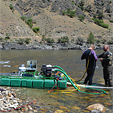Legislation & Regulation
Legislative and Regulatory Update
June 2020 by Scott Harn
• New California suction gold dredging regulations released—and they are just as bad as we predicted
We’ve warned our readers many times about not getting their hopes up. After years of delays, California finally released their proposed scheme for suction gold dredge permits, and it’s just what we expected. The California State Water Resources Control Board issued proposed regulations on May 13, 2020, but it reads more like a list of prohibitions.
Here are the highlights—or more aptly, the lowlights:
* A suction gold dredging permit will cost you $2,572.
* The reporting requirements (water quality, turbidity, etc.) are so extreme that you would really need to hire someone as an on-site monitor.
* Virtually all of the current and historical gold-bearing streams are off-limits due to endangered or threatened species, or due to the presence of mercury or other heavy metals.
As we have been stating for several years, the Board is appointed by the governor. If the Board does not do the governor’s bidding, they will be out of a job and new board members will be appointed to take those spots. There is very little science involved; it’s all driven by politics and money, and the environmental groups have plenty of money to spare. (If it were science-based, there would be a serious discussion about the mitigating factors and the benefits of dredging, including the removal of heavy metals from our waterways.)
There has been much time, effort and money wasted on trying to sway the opinions of the Board. The Board deliberately placed historic mining areas off-limits because they know that nobody in their right mind will pay in excess of $2,500 for a permit and conform to their extreme requirements to dredge in a river or stream where no gold is present.
Just last month, I wrote:
“I want to stress that states like California are not friendly to suction gold dredgers, and you should not expect any reasonable regulations to come from the California State Water Resources Control Board. California has delayed the implementation of a permitting scheme for years, and we expect the Board will continue to make most gold-bearing streams and rivers off-limits, include exorbitant fees and extreme reporting requirements, and restrict working times enough to make the endeavor unprofitable for all miners.
“Suction gold dredgers who apply for the Section 402 EPA permit are identifying themselves as polluters just by applying for the permit and should also be keenly aware of the citizen’s suit provision of the Clean Water Act. The Idaho Conservation League used this provision to sue several suction gold dredgers in Idaho; some dredged without the EPA permit while others went beyond the restrictions laid out in their permits.
“The only way to restore suction gold dredging, in our opinion, is to use federal preemption and change the regulatory scheme at the federal level.”
I still believe suction gold dredgers can and will overcome the permitting scheme put forth by states like California, but—as I’ve stated many times—the path must go through Washington, DC. I’ve been traveling to DC with Clark Pearson of Public Lands for the People now for four years. In 2019, we made five trips and spent a total of 35 days there. We’ve had some really good meetings with members of the Trump administration and his appointees. We all agree that there are at least three essential changes that need to be made in DC:
1) The federal government needs to assert federal preemption so miners can utilize a suction gold dredge on a federal mining claim. (We expect such an assertion to be made by BLM shortly through rulemaking; we are still working on the US Forest Service.)
2) The EPA needs to clarify that the need for a Clean Water Act permit is triggered by the “addition” of a pollutant, which is clearly defined in the statute, and that no such “addition” occurs when utilizing a suction dredge. (A petition has already been submitted to request this clarification. A face-to-face meeting at the EPA in DC was in the works, but had to be postponed due to the coronavirus.)
3) The miner needs to be given a choice—he/she can choose state or federal regulations, but both shall not apply because they almost always conflict, are duplicative, or states (like California) use them to outlaw mining.
Clark and I presented these proposed changes to members of the House and Senate in DC, along with staffers at BLM, USFS, MSHA, EPA, USGS, to President Trump’s advisor on energy and environment, and we even had a meeting with officials at the Pentagon. (We had another conference call with folks in DC in mid-May.) Our next trip will be to meet with Trump appointees at the EPA and it looks like we will also meet with one of his top advisors, but it may not be until after the 2020 elections.
I want to stress that despite what you read in the news, there are some smart people in DC who have a good grasp on the problems we miners face. We will get dredgers back in the water, but it’s not going to be by negotiating with the California State Water Resources Control Board. PLP and ICMJ are committed to seeing this through. I realize it’s not happening as quickly as you or I would like, but we haven’t lost sight of the goalposts. With your continued support, we will get it done.
Links to our proposed legislation and to the California Water Board regulations and comments page are included in the free online version of this article.
Comment letters must be received no later than 12:00 p.m. (noon) on Monday, June 29, 2020. Written comment letters must be addressed to:
Jeanine Townsend, Clerk to the Board
State Water Res. Control Board
P.O. Box 100
Sacramento, CA 95812-2000
Comment letters may be submitted electronically, in pdf text format (if less than 15 megabytes in total size), to the Clerk to the Board via e-mail: commentletters@waterboards.ca.gov If the file is greater than 15 megabytes in total size, then the comment letter may be submitted by fax at (916) 341-5620. Please indicate in the subject line: “Comment Letter – Suction Dredge Mining General Permit.”
• Dredgers file US Supreme Court response in Oregon case
The Pacific Legal Foundation (PLF) filed their “reply in support of petition for writ of certiorari” in the US Supreme Court case Eastern Oregon Mining Association, v Oregon Department of Environmental Quality.
As you may recall from past issues, the main contention in this case is that the Oregon DEQ has been forcing suction gold dredgers and other in-stream miners to obtain a Section 402 EPA permit under the Clean Water Act when the Clean Water Act clearly states that there must be the addition of a pollutant to trigger the need for such a permit.
The miners appealed a decision by the Oregon Supreme Court to the US Supreme Court over this issue. The Oregon DEQ initially waived their right to file briefs with the US Supreme Court, then were ordered to respond by the Court.
PLF filed a ten-page response to DEQ’s response, and points out that this issue is ripe for review by the US Supreme Court. PLF’s response is too lengthy to include here, but rest assured they did a great job in laying out the miners’ case.
We expect the US Supreme Court will decide whether or not to hear this case in early June and we’ll provide an update on our website at www.icmj.com.
• Washington State pushes same suction gold dredging narrative
Washington State continues their assault on suction gold dredgers too. The State passed legislation (ESHB 1261) to prohibit suction dredging in critical habitat areas, ignoring the fact that dredges were not allowed to operate during spawning seasons and the many benefits dredging provides by removing heavy metals and creating thermal refugia.
The bill was signed by Governor Inslee on March 18.
Washington State’s action provides further evidence that it’s past the time for federal intervention and federal preemption on federal mining claims.
• Pentagon reverses decision on rare earth projects
Last month I wrote about China’s firm control over rare earth refining and production, and explained how the Chinese government even has influence over MP Materials, the current operator of the Mountain Pass mine in Southern California. (See “It’s Time to Get the Heck Out of China” in our May 2020 issue.)
During our trips to Washington, DC with Public Lands for the People over the past four years, we’ve established relationships with staffers for members of the Senate Armed Services Committee, department heads at the Dept. of Interior and the USDA, and a few influential people at the USGS and the Pentagon. All of them were sent copies of that article. As a result, we were contacted by folks in DC for a conference call, and learned that Australia-based Lynas Corp, which is one of the few rare earth mining and processing companies operating outside of China, may also have ties to China.
Lynas’ operates a rare earth processing facility in Malaysia, but the end product is sent—you guessed it—to China for final processing.
On April 29, the Pentagon announced that they suspended the contracts awarded to MP Materials and Lynas Corp. pending further review.
Meanwhile, Senator Ted Cruz (R-Texas) introduced legislation titled the “Onshoring Rare Earths Act” (ORE Act) to help establish a US-based supply chain that would require the Defense Department to source rare earth minerals here in America and would include tax incentives for buyers who purchase them from American sources.
The Pentagon has also proposed increasing spending caps for rare earth elements to $1.75 billion. According to the Pentagon, each F-35 fighter plane needs 920 pounds of rare earths, while a Virgina-class submarine requires over 9,000 pounds of rare earths.
Legislative and Regulatory Update
MMAC Update
We spent our evening at some informal get-togethers at two private residences in the DC area, which provided the opportunity to talk with staff members from Congress, other agencies, and a few consultants working on public land issues. We found common ground with many of them, and found a strong ally in a former Congressman turned consultant who agreed that Mining Districts provide the smartest legal route...
MMAC & PLP Update
 …what I’d like to focus on in this update is the assistance they provided to a suction gold dredger in Idaho being harassed by an environmental group.
…what I’d like to focus on in this update is the assistance they provided to a suction gold dredger in Idaho being harassed by an environmental group.
Oregon's Waldo and Galice Mining Districts Unite
We ask that all who attend this demonstration bring their mining equipment to display and actively talk with the attending public in a courteous fashion about the benefits of suction dredging…
Legislative and Regulatory Update
• Comment deadlines approaching for frog listings and habitat
• EPA seeks more control
• Comments due in Washington
• California dredging moratorium
• PLF sues to delist polar bear
Successful Rally for Suction Dredge Miners in Idaho
 Representative Paul Shepherd stopped by, and Idaho County Commissioner Jim Chmelik dove with one of the dredgers so he could see for himself that no harm was being done to fish or their habitat.
Representative Paul Shepherd stopped by, and Idaho County Commissioner Jim Chmelik dove with one of the dredgers so he could see for himself that no harm was being done to fish or their habitat.
Significant Progress for California Suction Gold Dredgers
It was a milestone day in the battle to maintain the rights of miners to dredge on federal mining claims in California.
Subscription Required:
The Bawl Mill
• Our Readers Say Re: It's Time to Get the Heck Out of China
• Ask The Experts - What’s the status of suction gold dredge permitting in California?
• Ask The Experts - How do I properly and safely dispose of blasting caps?
• Ask The Experts - How much silver per ton does it take to make a mine profitable?
• Ask The Experts - How clean do my gold concentrates need to be to pour a gold button or bar?
• Ask The Experts - What is the name and model of the old jaw crusher pictured in last month’s issue?
• Dredging Tips and Tricks: T-80 Air Compressor Maintenance
• Hard Rock 101: Mechanical Techniques
• Clearing the Nugget Trap with a Detector
• Resurrecting an Old Hard Rock Mine—Setting Up the Millsite
• Desert Prospecting Yields More Than Just Gold
• Memories of Shirttail Creek, Northern California
• Indictments Pile Up for Gold Traders
• Melman on Gold & Silver
• Mining Stock Quotes and Mineral & Metal Prices
Free:
Seeking The Truth—A Letter From the Editor
• PLP Update: The Path for Legally Re-Starting Suction Gold Dredge Mining in 2021








